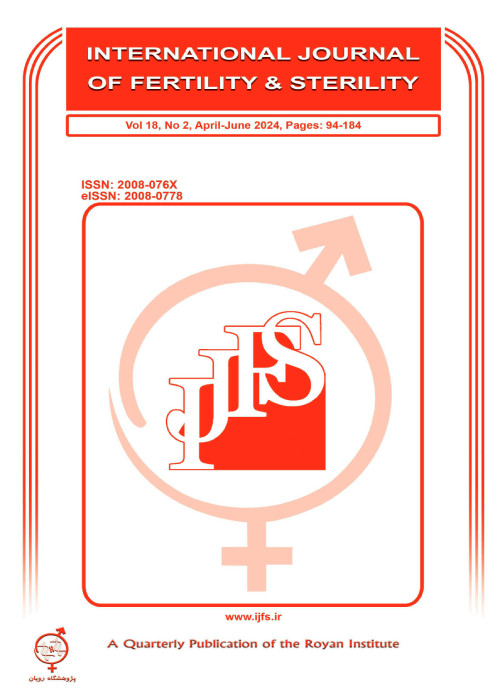Dietary Patterns and The Outcomes of Assisted Reproductive Techniques in Women with Primary Infertility: A Prospective Cohort Study
Author(s):
Article Type:
Research/Original Article (دارای رتبه معتبر)
Abstract:
Background:
Infertility is one of the most common challenges that women in reproductive age would encounter today. The maternal nutritional status could be a determinant of oocyte quality and embryonic growth. This study was conducted to assess the relationship between dietary patterns and reproductive outcomes in infertile women.
Materials and Methods:
This prospective cohort study was conducted on 140 women with primary infertility who had referred to Isfahan Fertility and Infertility center, Isfahan, Iran. The average number of total oocytes and metaphase II oocytes, the fertilization rate, the ratio of good and bad quality embryo and biochemical and clinical pregnancy were considered as the outcomes of assisted reproductive techniques (ART). A 168-item food frequency questionnaire was used for estimating the dietary intakes during the last year. Factor analysis was used for identifying the dietary patterns and analysis of variance (ANOVA), analysis of covariance (ANCOVA), chi-square, and logistic regression analysis were used for assessing the relation between dietary patterns and ART’s outcomes.
Results:
Three major dietary patterns (the healthy, western and unhealthy diet) were identified. Women with high adherence to the “healthy diet” had a higher educational level and were employed. There was a significant increase in the average number of total oocytes (P-trend=0.009) and metaphase II oocytes (P-trend=0.006) in the third tertile of “healthy diet” compared to the first tertile. Also, women with high adherence to the second tertile of “unhealthy” diet compared to the first tertile, had a significantly lower chance of getting pregnant [odds ratio (OR): 0.14, 95% confidence interval (CI): 0.3-0.7].
Conclusion:
Nutrition status could affect infertility treatment outcomes. Greater adherence to the healthy diet may enhance oocyte quality and quantity. Unhealthy diet could adversely affect the chance of getting pregnant.
Keywords:
Language:
English
Published:
International Journal Of Fertility and Sterility, Volume:12 Issue: 4, Jan-Mar 2019
Pages:
316 to 323
magiran.com/p1886195
دانلود و مطالعه متن این مقاله با یکی از روشهای زیر امکان پذیر است:
اشتراک شخصی
با عضویت و پرداخت آنلاین حق اشتراک یکساله به مبلغ 1,390,000ريال میتوانید 70 عنوان مطلب دانلود کنید!
اشتراک سازمانی
به کتابخانه دانشگاه یا محل کار خود پیشنهاد کنید تا اشتراک سازمانی این پایگاه را برای دسترسی نامحدود همه کاربران به متن مطالب تهیه نمایند!
توجه!
- حق عضویت دریافتی صرف حمایت از نشریات عضو و نگهداری، تکمیل و توسعه مگیران میشود.
- پرداخت حق اشتراک و دانلود مقالات اجازه بازنشر آن در سایر رسانههای چاپی و دیجیتال را به کاربر نمیدهد.
دسترسی سراسری کاربران دانشگاه پیام نور!
اعضای هیئت علمی و دانشجویان دانشگاه پیام نور در سراسر کشور، در صورت ثبت نام با ایمیل دانشگاهی، تا پایان فروردین ماه 1403 به مقالات سایت دسترسی خواهند داشت!
In order to view content subscription is required
Personal subscription
Subscribe magiran.com for 70 € euros via PayPal and download 70 articles during a year.
Organization subscription
Please contact us to subscribe your university or library for unlimited access!


